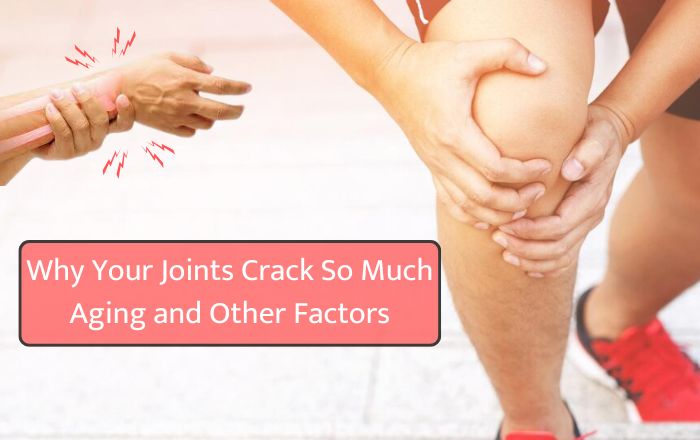We’ve all experienced it at some point: that unexpected cracking or popping sound from our joints. Some find it concerning, while others may even enjoy it. But why does this happen? Is it related to aging, and should you be worried if it happens frequently? In this blog, we’ll explore the reasons behind joint cracking, how it’s connected to aging and other factors, and when it might be time to seek help from a healthcare professional.
Common causes:
1. Gas Bubbles in the Synovial Fluid
Synovial fluid is a thick liquid that lubricates your joints, helping them move smoothly. When you stretch or bend a joint, you may release gas bubbles within this fluid, causing a popping sound. This is the same reason your knuckles crack when you pull on them, and it’s usually nothing to worry about.
2. Ligaments and Tendons Shifting
Ligaments and tendons are the tissues connecting muscles and bones. When you move a joint, these tissues may snap back into place, producing a cracking or popping sound. This often happens when you perform repetitive movements or sudden stretches.
3. Bone-on-Bone Contact
As we age, cartilage — the cushion between bones — may wear down due to conditions like osteoarthritis. This deterioration can cause bones to rub against each other, resulting in a cracking or grinding sound. While occasional sounds are common, chronic pain and frequent grinding may be signs of joint degeneration.
4. Movement and Pressure Changes
Sudden movements can cause a pressure shift in the joint, which may result in a cracking sound. For example, when you stand up quickly, the change in pressure can create a popping sound. This is often more noticeable in large joints like knees and shoulders.
Aging and Increased Joint Cracking
Aging is one of the most common factors linked to increased joint cracking. As we grow older, several natural changes occur in our bodies that may make joints more prone to producing sounds:
1. Cartilage Wear and Tear
With age, the cartilage in our joints naturally wears down. This degeneration can make joints feel rough and lead to bone-on-bone contact. The result is often more frequent cracking or grinding sounds, especially in weight-bearing joints like knees and hips.
2. Changes in Synovial Fluid
The consistency of synovial fluid may change over time. In some cases, it becomes less effective at lubricating joints, which can lead to sounds during movement. Aging also reduces the body’s ability to produce synovial fluid, making joints stiffer and noise-prone.
3. Weaker Muscles and Ligaments
Aging can lead to muscle weakening and the loss of joint flexibility. This lack of support for joints increases the likelihood of tendon and ligament shifts, making cracking and popping sounds more common.
4. Increased Risk of Osteoarthritis
Osteoarthritis, a condition where the cartilage in the joints wears away, becomes more common with age. This condition often leads to painful joints that produce sounds due to bone friction. If you experience persistent pain, stiffness, and cracking sounds, it’s essential to consult an orthopedic doctor.
Other Factors That Contribute to Joint Cracking
Apart from aging, several lifestyle and health factors can contribute to joint cracking:
1. Physical Activity
Active individuals, especially athletes, often experience more joint cracking. Frequent bending, twisting, and stretching of joints can cause the surrounding ligaments and tendons to produce sounds. However, if there’s no pain associated with the cracking, it’s typically not a cause for concern.
2. Weight and Body Composition
Excess body weight stresses joints, particularly in the knees, ankles, and hips. This added pressure can cause joints to crack more frequently, and over time, it may increase the risk of joint issues.
3. Hydration and Nutrition
Proper hydration and nutrition play crucial roles in joint health. Dehydration can reduce synovial fluid, making joints stiff and more prone to producing sounds. Additionally, a diet lacking in joint-supportive nutrients, like omega-3 fatty acids, calcium, and vitamin D, can affect joint health and mobility.
4. Injuries and Past Trauma
Joint injuries or trauma from accidents or overuse can lead to instability and chronic cracking sounds. Even after healing, some injuries may leave joints weaker or prone to cracking, especially if ligament or cartilage damage is involved.
5. Joint Hypermobility
Some people have naturally more flexible joints, known as hypermobility. These individuals may experience more frequent cracking sounds due to the greater range of motion in their joints. While often harmless, hypermobility can sometimes lead to joint instability or increased wear and tear over time.
When Should You Be Concerned?
While occasional joint cracking is harmless, certain symptoms should not be ignored. Consider consulting a healthcare provider, such as an orthopedic doctor, if you experience:
1. Pain or Swelling: Persistent pain, swelling, or tenderness around the joint may indicate inflammation, arthritis, or another underlying condition.
2. Reduced Range of Motion: Difficulty moving the joint or stiffness that doesn’t go away could be a sign of a more serious issue, such as osteoarthritis.
3. Consistent or Worsening Sounds: If joint cracking is consistent or worsening over time, it may indicate joint degeneration, especially if accompanied by discomfort.
Ways to Keep Your Joints Healthy
To keep your joints healthy and reduce cracking, you can adopt the following habits:
1. Stay Active
Regular physical activity strengthens muscles and ligaments, offering better support for your joints. Focus on low-impact exercises like swimming, cycling, and walking.
2. Maintain a Healthy Weight
Managing your weight can reduce the stress on weight-bearing joints, decreasing the risk of cracking sounds and joint pain over time.
3. Stay Hydrated and Eat Well
Drinking water and eating a balanced diet rich in vitamins and minerals, especially calcium and vitamin D, can help support joint health.
4. Consider Supplements
Certain supplements, like glucosamine and chondroitin, may help improve joint flexibility and health. Consult a healthcare provider before adding these to your routine.
5. Warm Up and Stretch
Stretching before exercise helps prepare joints for movement and reduces the risk of ligament and tendon shifts that can lead to cracking sounds.
Joint cracking can be a natural part of aging, and for most people, it’s a harmless phenomenon. However, if you experience additional symptoms such as pain, swelling, or stiffness, it may be time to seek medical advice. Consider visiting Ojas Multispeciality Hospital. Their team of experts can help diagnose and treat joint conditions effectively. For specialized care, Orthopedic doctor in Ravet can offer personalized treatment options to help maintain your joint health and overall well-being.




